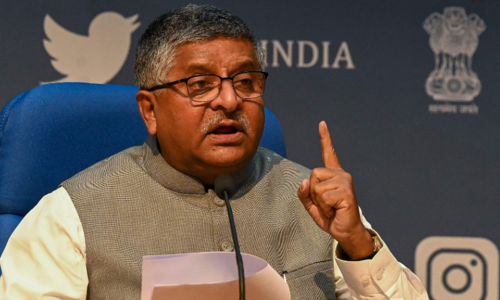DESPITE the serious reservations of digital rights activists and tech companies, the federal government has steamrolled its way to notifying its amended but still draconian social media rules. The IT ministry notified the rules this week, after cabinet approval was given for the amendments.
The IT minister in a statement said the rules would require social media companies to abide by Pakistani laws. Ironically, Minister Aminul Haque also claimed that Pakistani internet users will have the “full right to freedom of expression”, even though the rules portend the opposite ie the space for free expression will continue to shrink.
A closer look at the amended rules reveal what is so troubling. Though it appears that the government has eased its stringent requirements for tech companies, the ‘relaxations’ are cosmetic and the threat of censorship, internet surveillance and morality policing remains ever-present. Cosmetic measures include, for instance, the Pakistan Telecommunication Authority now giving 48 hours, instead of 24, to a social media company to remove or block access to online content.
Moreover, the government now requires social media companies to establish brick-and-mortar offices in Pakistan “as soon as possible”, as opposed to a nine-month deadline. Though these timelines have been ostensibly eased, the model being followed closely resembles that of the drastic rules put in place by the authoritarian government across the border. India, a key overseas market for tech companies, earlier this year made similarly stringent demands which were criticised as encouraging internet platforms to over-censor, requiring dangerous content regulation tools and retaining a large amount of data to be handed over to the government.
In Pakistan, the government has made eerily similar demands. Among them, is the ban on live-streaming “immoral and obscene content” — a euphemism that is often invoked to allow moral policing. Content that goes “against Pakistan’s cultural and moral trends” is also banned. If a tech company fails to respond to the PTA’s request for removal or blocking of content within 48 hours, the authority can send a notice, and later “degrade the services” of the service provider for a limited time. If the company still doesn’t respond, its information system can be blocked or it could face a fine of Rs500m.
Since the rules were first framed in November 2020, various justifications — ranging from national security to economic benefits — have been given by government spokespersons who wish to validate their existence. While the government’s security concerns may be legitimate, the reality, however, is that these rules give censorship-hungry officials the power to clamp down on freedom and access citizen data that should remain encrypted.
The fact that these rules have been notified without approval from parliament and without engagement with digital rights stakeholders says a lot. Under the Prevention of Electronic Crimes Act 2016 — an everlasting curse of the PML-N — these rules are now in force, and serve as a dark reminder of state excesses.
Published in Dawn, October 16th, 2021
















































